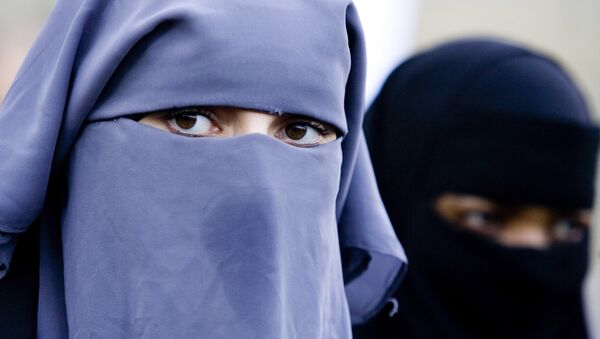Women apparently from Saudi Arabia, Yemen and other countries have joined forces to protest against niqabs, hijabs and other face veils, many are forced to wear in the religiously conservative countries. Posts with the hashtag in Arabic that could be translated as “veil under my feet”, or #NoHijabDay and #FreeFromHijab are popping up on Twitter, as some sharing pictures of them literally stepping on headscarves or other kinds of covers.
#النقاب_تحت_رجلي المقدس لدى جبال طويق أسفل قدمي 💚😂😂🐾💃💃 pic.twitter.com/iQVnZHAM5k
— 🕊 (@ligero2021) 27 декабря 2018 г.
#النقاب_تحت_رجلي ewwwwweew I didn’t know how accepting that thing it’s really disgusting pic.twitter.com/zFTauYNAs2
— روان الحلوه (@Rwn1811) 27 декабря 2018 г.
#النقاب_تحت_رجلي قاعده ادعس الهااااتكم pic.twitter.com/p0xXoqxtZ0
— عبدة كورة (@troll68843004) 27 декабря 2018 г.
Some seemingly got creative, posting videos from cars, waving the head scarf in the air.
#النقاب_تحت_رجلي
— A (@firar_a) 27 декабря 2018 г.
فلت يديييييك طيرنااااا عالسما
أنااااا حر مش مجبوووور عالطاعة🎼 pic.twitter.com/0fi2MpadcP
There were those, inspired to tell their stories of going against conservative rules, school policy or abuse in the community and in the family.
#النقاب_تحت_رجلي When I decided to take off my niqab my mother’s reaction was to tell me that she would never forgive me. I stood by my decision & endured months of emotional-blackmail & verbal abuse on her part. It wasn’t a choice for me & it isn’t for many girls in my country.
— :-) (@disgosted) 27 декабря 2018 г.
I decided to do it anyway. I got off the plane at our local Saudi airport niqab-less. It took a lot of courage. Afterwards my mom shunned me for days & scolded & mocked me in front of all of my siblings. My relationship with her has been rocky since. 9/10
— :-) (@disgosted) 29 декабря 2018 г.
Okay first of all there’s women out there who want to wear hijab and we should respect that second of all I really don’t want to wear it but I’m forced to and I really think that girls should have the right to choose to wear it or not. #النقاب_تحت_رجلي
— فَيّ (@pur_ple6) 28 декабря 2018 г.
Activists living in Western countries also joined the online resistance and encouraged its participants.
Women and girls are murdered in countries all over the world for not wearing hijab
— Yasmine Mohammed (@ConfessionsExMu) 27 декабря 2018 г.
If it’s not the government forcing her, it’s the society, the community or the family
Even in my country of #Canada, a 16 yr old girl, Aqsa Parvez, was killed by her family for not wearing hijab https://t.co/LndbtQxsNf
The niqab is under your feet, you know you are worth more than anything your country is currently giving you. You are not an object, not a diamond, not a covered lollipop! You are a human being with intelligence and strength that must be showcased.#النقاب_تحت_رجلي
— Daya (@wildiKON) 29 декабря 2018 г.
However, many slammed the movement, saying it interferes with personal choice, or perverts the meaning of freedom.
"The real meaning of freedom and liberaty in the west"
— ن. ⚖️ MBS (@NouphAlSh) 27 декабря 2018 г.
#النقاب_تحت_رجلي pic.twitter.com/oiyyF6bZ2q
#niqab is our choice. You're talking about freedom so let's do whatever we want. We love💓 our countries🕋 and our families. We have a freedom to do what we do. You're not our guardians. Get your obsessive thoughts out of here.#النقاب_تحت_رجلي 👎
— 🇪ntisar | انتصار العوفي (@mezlmas) 27 декабря 2018 г.
Some came up with fruit analogies.
اذا رحت السوق اي وحده بتأخذ ؟#النقاب_تحت_رجلي pic.twitter.com/Ob1DpVUMMB
— abo_ali (@aboali53085005) 27 декабря 2018 г.
The limitations on women’s rights have been relaxed in Muslim countries across the Middle East over recent years. Earlier this year Iranian women were permitted to attend a basketball game watching male players play in a historic breakthrough for the country. Iran also allowed women to cheer on their World Cup 2018 national team from the stands and to attend the Asia Champions League final in Tehran in November for the first time since the Iranian Revolution of 1978-1979, which saw the overthrow of the 2,500-year-old Persian monarchy, deposing Mohammad Reza Shah Pahlavi.
However, these were specific cases, the restrictions were soon restored, and it is still forbidden for women to attend football matches. Wearing headscarves, or hijab, in public is also mandatory for women there. So several dozen women who took theirs off in protest this year were accused of public order offences and referred to the state prosecutor's office. According to Al-Arabiya, women showing their hair in public can be jailed for up to two months or fined $25.
Iran’s regional rival, Saudi Arabia, formally allowed women to drive this summer in the course of a reform programme, introduced by Crown Prince Mohammed bin Salman. Separately, it has curbed previously overwhelming religious policing, as well as lifted a 35-year-long ban on national movie theatres. As to clothing rules, this March, the prince said in an interview with the US broadcaster CBS it was up to women to choose what they want to wear as long as it is decent.
READ MORE: Saudi Arabia May Execute First Woman for Supporting Political Protests
"The laws are very clear and stipulated in the laws of Sharia (Islamic law): that women wear decent, respectful clothing, like men. This, however, does not particularly specify a black abaya [loose full-length robe] or a black head cover. The decision is entirely left for women to decide what type of decent and respectful attire she chooses to wear", he stated.


